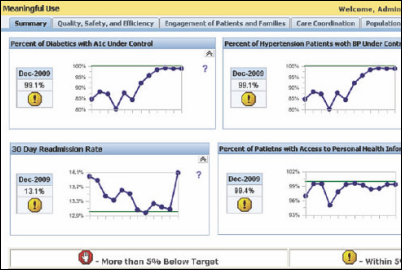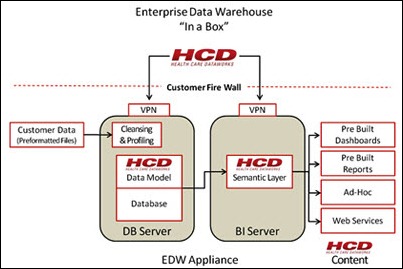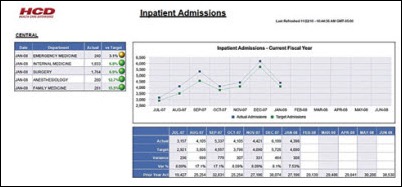HIStalk Innovator Showcase – Health Care DataWorks 9/12/11
Company name: Health Care DataWorks, Inc.
Address: 1801 Watermark Drive, Suite 250, Columbus, OH 43215
Web address: www.hcdataworks.com
Telephone: 614.255.5400
Year founded: 2008
FTEs: 20
Elevator pitch
HCD provides business intelligence solutions that enable healthcare organizations to improve quality and reduce costs.
Business and product summary
Our products are innovative in that they are an accelerator for organizations that recognize the need to leverage their siloed data to improve their performance, but don’t want to spend years building an enterprise data warehouse (EDW) from scratch. Health Care DataWorks (HCD) brings a pre-built, packaged EDW that is immediately ready to feed data. Our clients are able to see value within months rather than years.
HCD’s EDW Appliance bundles robust hardware, AIX operating system, Oracle 11g database, HCD’s own comprehensive enterprise data model, plus hundreds of pre-built standard reports and a dozen pre-built dashboards with hundreds of key performance indicators with drill-down capability covering quality, Meaningful Use readiness, revenue cycle, operating room, nursing scorecard, to name just a few.
Our company is innovative in that it was founded and is managed by people that grew up in hospitals and health systems, as opposed to within a vendor organization. Our CEO has been a healthcare CIO for most of the past 20 years at various-sized organizations. Our COO led business intelligence development efforts at a major academic medical center for over eight years. As such, HCD has “walked a mile” in the shoes of its clients and has a unique, first-person understanding of the problems that healthcare executives are trying to solve with integrated data.
Finally, HCD is innovative because — unlike the Goliaths in the industry that it typically competes with, such as Oracle, IBM, and SAP, which have many product lines and foci — HCD has a laser focus on delivering innovative, value-added business intelligence solutions to hospitals and health systems, and as such, can be much more nimble and responsive to its customers.
Strategic Roadmap — for organizations very early in thinking about how they will use BI / analytics / EDW. This process will ensure you have buy-in for whatever decisions you make in this area and takes approximately five months.
Dashboard Appliance — for organizations that want to do a proof of concept for an EDW or to meet a specific need that requires a dashboard solution. Low price allows starting on the path towards an EDW without losing any of work done in populating the dashboards.
EDW Appliance — for organizations that are ready to build an Enterprise Data Warehouse and want tools and technology to accelerate that process.
Large and mid-market hospitals and hospital systems.
Customer problems solved
HCD’s products allow the users to pull data from multiple source systems making the data accessible in one location. The ability to run reports and drill down using friendly dashboard interfaces gives decision makers the information required to make knowledge-based action plans.
Competitors
Microsoft, Oracle, and IBM are a few of the better-known competitors in the industry.
Advantages over competitors
As a spin-off from the Ohio State University Medical Center, the founders of Health Care DataWorks have developed and worked the product from the ground up.
List five fast facts about the company or product.
- Ohio State University Medical Center spin-off.
- All five founders have worked or still work with the EDW at OSU.
- Won TechGenesis Grant of $50,000 after to a market analysis that determined a large unmet need for the product.
- Named Gartner “Cool Vendor” 2011.
- The EDW Appliance was one of the first data warehouse solutions to achieve Stage 1 Meaningful Use certification.
Pitch video created specifically for this Showcase
What problems have you solved using HCD’s product and what has been the overall impact on your organization?
We are in the very early stages of implementation, having just signed a contract. Our vision project vision statement is:
To support our mission and vision, we will implement a set of business intelligence tools and a data warehouse, starting in 2011, that will transform integrated clinical, financial, and operational data from the disparate systems throughout the organization to information that is aligned and driven from the strategy and will support real-time decision-making to enhance clinical care, support research, and facilitate economic and financial forecasting
The impact to the organization has not been profound as of yet, but we are looking for some innovative solutions which will empower our decision-makers with data to make good business and clinical decisions. Having the data at their fingertips vs. having to contact IS for the data or to run a report; providing dashboard capabilities related to their KPIs and quality indicators; looking at predictive analytics to utilize the value of the data as we look at risk-based contracts, etc.
If you were talking to a peer from another organization, how would you describe your experience with HCD?
The experience has been very positive. HCD has been very responsive and knowledgeable about healthcare data warehouse and business intelligence. They have also been very flexible in terms of contracting and even providing a proof of concept phase of the project / contract. It has been a much different experience working with a smaller, more nimble company than some of the bigger players who may dictate how the process will work.
How would you complete this sentence if again speaking to a peer? "I would recommend that you take a look at HCD under these circumstances:"
HCD is a startup company, and as such, you will be taking on more risk than a mature vendor, but the risk may well be worth the reward given their current products, future offerings, and expansive healthcare knowledge.
An interview with Herb Smaltz, CEO of Health Care DataWorks
A lot of big companies sell dashboards and data warehouses. Why would customers choose to buy from a small, healthcare-only vendor?
We are laser focused on healthcare. Competitors obviously have lots of different product lines, lots of different vertical markets.
The other thing that resonates with our customers is that we all came from the health system. I’ve been CIO pretty much my whole career, dating back to even before you could call it a CIO job. I’ve been doing this for a long time, sitting in that chair trying to solve these kind of problems. Our COO, Jason Buskirk has been working in the BI department building BI apps and solving those problems from a development standpoint inside the health system for eight years. All of us on the senior team that spun this technology out of Ohio State have been doing this for a long time.
We’re a young company. We’re three years old now, but we’ve been harboring this technology over 13-14 years now in a major academic medical center with built-in health system. Again, trying to solve these kinds of problems of data integration and really making sense of really heterogeneous, really potentially dirty data to solve business problems.
I think those things resonate with our customers. That we walked a mile in their shoes and were one of them, if you will. Even though we are clearly a vendor company, well grew up in health systems and the technology has really been hardened in that kind of an environment.
We went through those years of at OSU where we were stubbing our toes on the best way to build a data model; the best way to build performance; the best way to build query capabilities. For most startups, they’re stubbing their toes with their customers as they build their product.
I think all those things make it a little more comfortable for folks to go with Health Care DataWorks.

You offer your product as an appliance in one configuration. Realistically, what kind of time, effort, and skill set would a client need to connect everything and go live?
That’s one of the things that we offer as a value proposition. We’re really an accelerator for organizations that are right at that precipice of trying to figure out how to get all their data to work together.
If you talk to people like Gartner and others, for the folks who try to build it themselves, it’s a good three-year prospect to build it from scratch. We’ve packaged everything: the hardware, operating system, Oracle 11g database licenses, our own very comprehensive data model, and tons of content. Lots of pre-built dashboards with scorecards and hundreds of reports.
Essentially, we can just drop that in to an organization’s data center or just use our hosted data center, whichever they prefer. Instead of sitting around a table having discussions about how these tables should be built and what these data elements ought to be called and how the table joins ought to work, they’re immediately just working on populating this packaged data warehouse appliance that we bring to them. Within four to six months, they’re typically using one of the dashboards. They’re using a bunch of standard reports in whatever area they’re focused on.
But one caveat. Source data that comes from those various EMR systems, ERP systems, scheduling systems — you name it, there’s tons of systems in a hospital and health system — they’re notoriously dirty. When you bring that heterogeneous data into an appliance, what it exposes is some of that dirty data.
One of the things that can cause delays is data governance. Seeing that the data is not good, having to go back to the source systems and the owners of those source systems — whether that be the chief medical officer or nursing or wherever the data was pulled from — and work with them on how to best move forward. Do you want to expose the data as it is, with some asterisks and caveats? Such as, “There are number of blank fields, but from this day forward, we’ve asked our registration folks to fill those fields in.”
That whole data quality, data governance within each hospital is a new core capability that they really need to develop. The ability to take their data from their various systems and help to make that cleaner and cleaner and cleaner over time.
But typically, it’s four to six months from the time that we sign a contract to the time that they can get use of a set of reports or a dashboard or a scorecard.
It’s been a year since you signed Orlando Health. What results have they seen?
Orlando Health is one of those organizations that this issue of data quality and data governance has come up. Very quickly, we were able to get their quality dashboard in place. One of the things they wanted to do to before they exposed it to their users was to clean up all their data.
I’m a fan of, you know, “data gets better with use.” Now to be sure, at a physician level or a patient level, you want to make sure that data is right. There’s that tradeoff. Orlando Health has really focused a lot on their data quality. They’ve been busy for a number of months working on data quality, getting the data quality up to speed. But their dashboard was ready and loaded with data within months of getting the appliance in place.
With another customer, Essentia Health, we did a proof of concept with them. Just three months later, they got a Top of the Hospital dashboard up. They put in place a data governance group, which has been meeting and working on those sorts of things.
It’s one of those things where the technology really isn’t the thing that holds people back. It’s the ability to make decisions about the data that it exposes and how they want to deal with that and handle it. In some cases their source system data is very clean and they can very quickly move on and deploy that to users. In Essentia’s case, that’s what happened.
In Orlando Health’s case, they had a number of fields that were blank in their source systems. For example, a referring physician is one of those that was blank. They had 160,000 instances of a blank referring physician. If you want to do analysis on where your patients are coming from, it’s important to fill that in. They had to go back to their registration department and essentially say, “We really need this field filled in.”
Anybody you talk to in the marketplace will tell you there’s no silver bullet technology that can overcome poor source system data quality issues. With all of our customers, we absolutely offer that acceleratory capability, to immediately let them start using the data. The question really becomes is whether the data coming from their source systems is of a high enough quality that they want to expose that to end users to make business decisions on. We very much work with them on that data governance process in making decisions around that and helping them to the point they’re exposing that data to make business decisions.
What do you hope to gain from the exposure?
As you mentioned, we are a small company. We don’t want to take anything for granted. We want folks to get an understanding of the company, the fact we’re laser focused on healthcare providers in particular. We very much appreciate it. Any small company can benefit from people knowing about you. We hope to be included in more RFPs, and we’re getting more and more. We just closed Presbyterian Health System in Albuquerque, New Mexico and Children’s Medical Center Dallas. Because we’re competing against folks like Oracle, IBM, and Microsoft and the exposure really does help.





Thank you for your comments on Amazon. Agree 100%